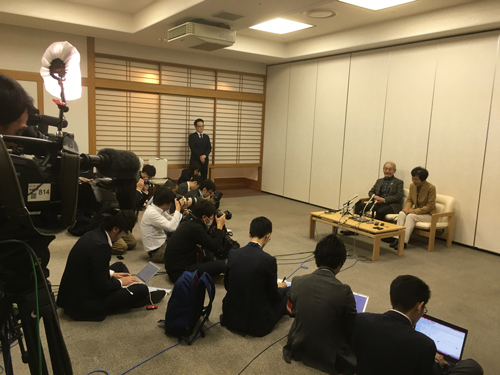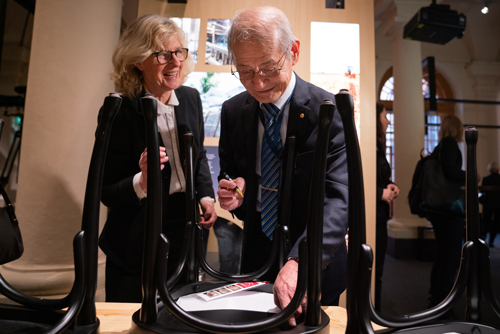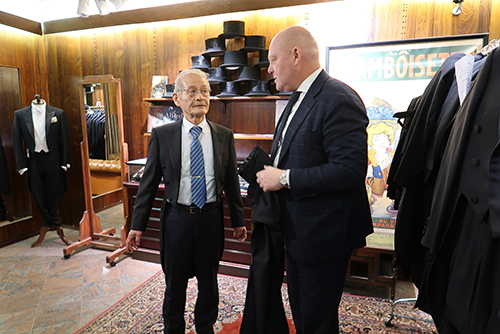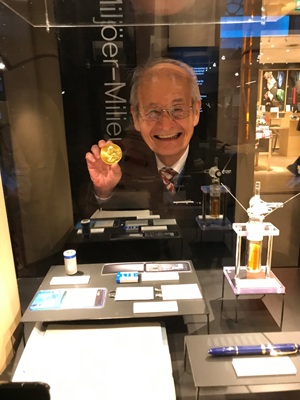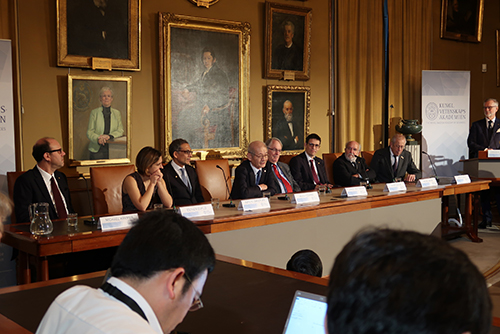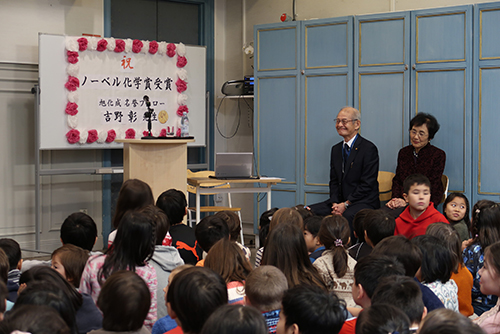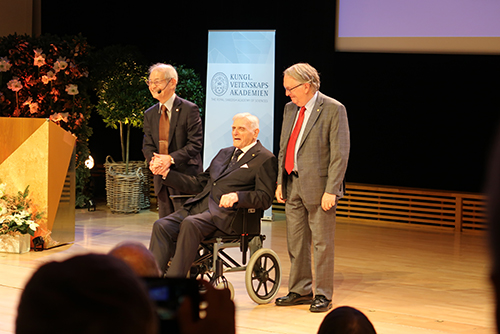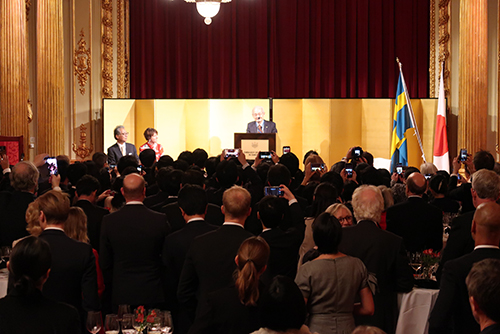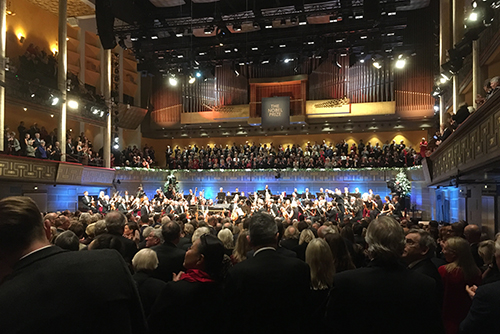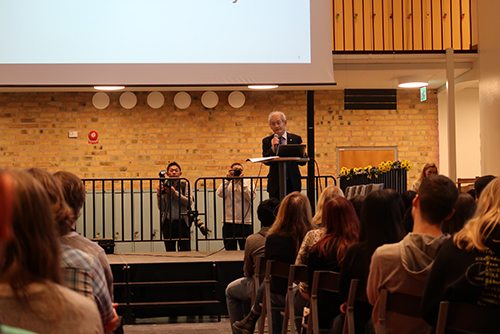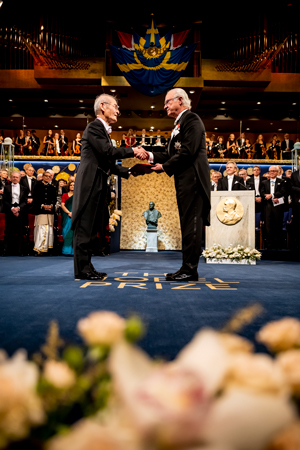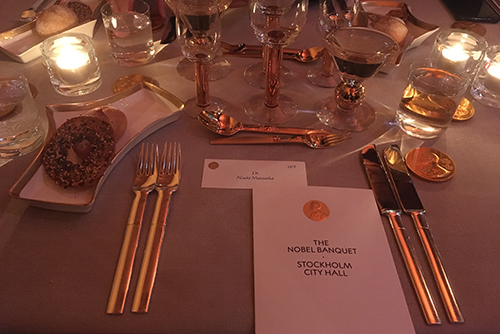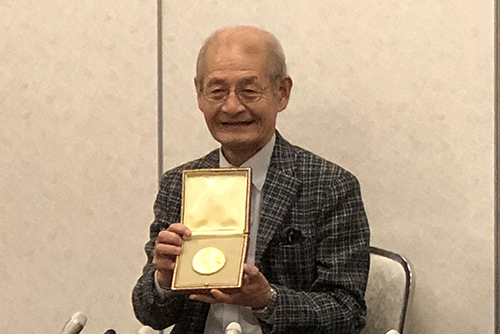100 Stories2019 Nobel Week Report
Dr. Akira Yoshino won the Nobel Prize in Chemistry in 2019 for the development of the lithium-ion battery. The award ceremony was held in Sweden on December 10, 2019. We reported on Dr. Yoshino's Nobel Prize from his departure from Japan on the day the prize was announced, along with the award ceremony, dinner, and various other events.
Every year on October 9, the day the Nobel Prize is announced, many members of the press and employees gather to await the announcement with bated breath. This “Nobel Prize Announcement Party,” which had been held for nearly 10 years, was becoming an annual event.
The contents of a battery are a combination of materials such as cathode material, anode material, separator, and electrolyte, and the combination of these materials is an important technology that determines the battery's characteristics. Dr. Yoshino had already won major overseas prizes for technological development, but there was a feeling that it would be difficult for him to win the Nobel Prize on his own.
However, the fall of 2019 was different. The announcement was made, “Dr. Akira Yoshino.”, and Dr. Yoshino's research was thus recognized around the world.
Yoshino said, “Don't aim to be a researcher who is recognized within your company; aim to be a researcher who is accepted outside the company.” These words mean, “In research and development, it is necessary to obtain research budgets, but you must also deliver to the world something that will properly contribute to society.” This will lead to external recognition and make you the kind of engineer that other companies want. If you become the type of engineer that other companies want, you will be recognized within the company.
Nobel Week is the period of time before and after the Nobel Prize award ceremony, which takes place on December 10 every year. Many events, including lectures by Nobel laureates, are featured.
December 5: Departure to Stockholm
At a press conference before leaving Japan, Dr. Yoshino said with a smile, “I’m not nervous. I feel like I'm floating in the air.”
December 6: Donated exhibits to the Nobel Museum/signed the chair at the customary Bistro Nobel/fitted for a tailcoat.
He took the golden pen, and after testing it once, he wrote “Akira Yoshino” among the names of other Nobel laureates in bold Japanese characters.
December 7: Visited the Royal Academy of Sciences/Visit to a Japanese supplementary school/Dinner hosted by the Royal Academy of Sciences
“The world will change through transformation. You are going to jump into that world,” he said, sending a message to the elementary school students.
December 8: Nobel Lecture (keynote speech)/Reception and press conference hosted by the Embassy of Japan/Nobel Prize Concert
The Nobel Lecture was the only event open to the general public, and he delivered a lecture titled “Brief History and Future of Lithium Ion Battery” in front of about 1,000 people. He said, “As a corporate researcher, my winning the Nobel Prize will encourage young corporate researchers.”
December 9: Visit to a local junior high school/Reception hosted by the Foundation & Royal Academy of Sciences
In a lecture at the local junior high and high schools, he said, “Batteries are one of the keys to solving environmental problems.”
December 10, Nobel Prize Award Ceremony/Evening Reception
He recalled, “I felt that I was charged with the responsibility to contribute to the realization of a sustainable society through lithium-ion batteries.” “The weight of the medal really helped the sense of accomplishment I had achieved sink in,” he said at the evening reception. “I can finally feel like I’ve reached my goal.”
December 11: Luncheon hosted by the Minister of Education, Culture, Sports, Science and Technology/Royal Palace Dinner
At the Royal Palace Dinner, dinner was a three-course meal consisting of an appetizer, main course, and dessert, with a variety of elaborate dishes. The goal of the guests dressed in Western style was to enjoy the conversation more so than the food.
December 14: The return to Japan
After a series of events in Stockholm, he returned to Japan on the morning of December 15 (Japan Standard Time). At a press conference, he expressed his feelings, saying, “I am relieved that the Nobel Lecture, the award ceremony, and the banquet went well.”
Dr. Yoshino left us with one last word: "If there are no fatal flaws, polish the technical sharp points to the hilt." This means that we should always check for fatal flaws, but instead of becoming mediocre by crushing small flaws, we should aim for overwhelming differentiation an becoming the best in the field.


